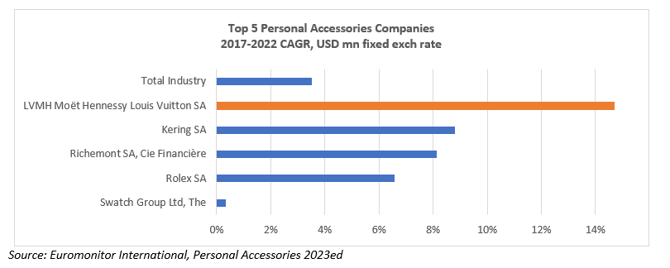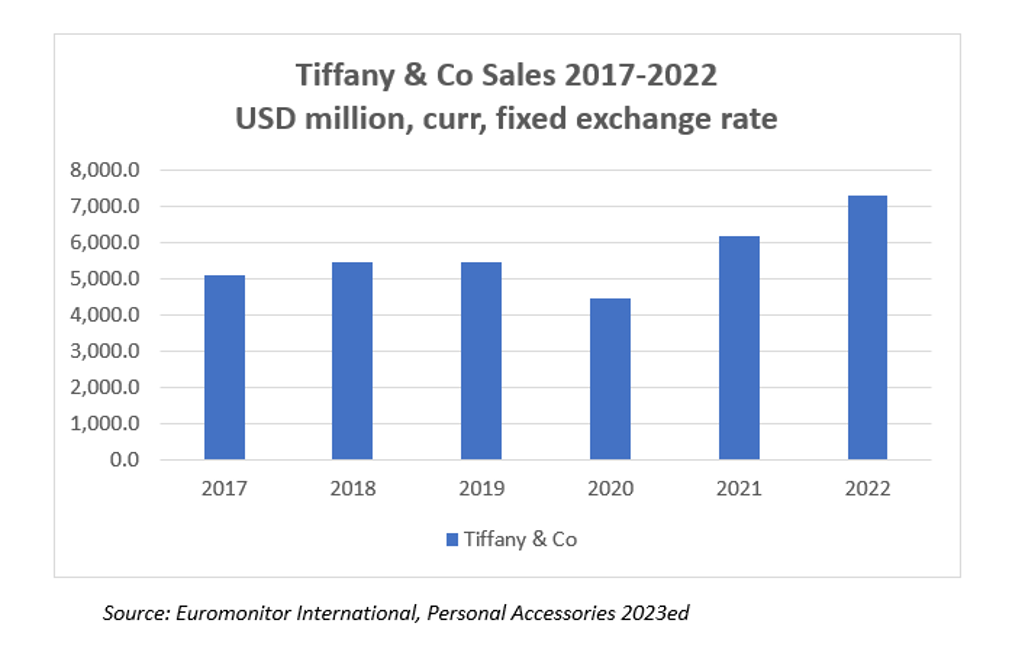LVMH sales return to pre-pandemic levels outperforming the industry and its closest competitors
LVMH Moët Hennessy Louis Vuitton SA (LVMH) sales surpassed pre-pandemic levels in 2021 already boosted by a strong recovery across categories and regions.
The company outperformed the industry and its closest competitors over 2017-2022 recording a 15% CAGR. The acquisition of Tiffany & Co, completed in 2021, is the big contributor to this performance.

All these factors combined allowed LVMH to gain almost two percentage points of share over 2019-2022 in what is, to date, a very fragmented personal accessories market. Its strong performance in bags, luggage and jewellery pushed LVMH’s sales in the last year to be 63% higher than in 2019.
Tiffany & Co acquisition, a good deal for LVMH
The acquisition of Tiffany & Co in 2021 was the largest contributor to LVMH’s growth over the historic period. This move allowed the company to rank third in jewellery and eighth in traditional and connected watches globally. The luxury jewellery brand brought USD6 billion of additional sales for LVMH in 2021 and turned Tiffany & Co into the group’s second largest brand.
Tiffany & Co’s strong performance is a result of a new strategy since LVMH took over, which, amongst other things, includes a shift in its advertising by putting more emphasis on social media and celebrities which has allowed the brand to successfully reach younger consumers.
Indeed, in 2021, Tiffany & Co launched the “About Love” campaign, starring Beyoncé and Jay-Z. As part of this collaboration, the brand partnered with BeyGOOD and the Shawn Carter foundation to create the Tiffany & Co About Love Scholarship Programme, which includes a donation of USD2 million in scholarships for students in arts and creative fields at Historically Black Colleges and Universities (HBCUs).
Social issues, and particularly racism and discrimination, have been in the spotlight in the US since the death of George Floyd in 2020. Brands across many industries have responded to this trend, either by supporting the Black Lives Matter movement, partnering with Black celebrities, or targeting their campaigns towards Black consumers.
According to Euromonitor’s Voice of the Industry: Sustainability Survey, 62% of respondents understand sustainability as “Prioritising Social, Environmental and Governance issues”. It is expected that, over the forecast period, brands will continue to develop their messages around social issues across the world as consumers demand them to act.
The acquisition of Tiffany & Co has clearly paid off, as the brand had a record-breaking year in 2021 and posted double-digit growth in 2022.

Sustainability and an omnichannel strategy are core areas for LVMH’s future growth
Although more moderate, LVMH’s 2022 growth remained in the double digits as COVID-19 restrictions were lifted across the globe and consumers resumed travel and their normal activities.
In its Q3 2022 report, the company defined four focus areas to support future growth and gain market share: omnichannel strategy, innovative and high-quality products, selective investments, and sustainability.
Given the current challenging environment, the company plans to be selective in its investments, especially when it comes to store expansions.
LVMH aims to leverage the strong momentum of online sales to reinforce its omnichannel strategy. It will continue the digitalisation of its brands, aiming to enrich the consumer experience both online and in the store.
As for sustainability, LVMH set its LIFE 360 programme and its 2023, 2026 and 2030 environmental objectives around four areas: creative circularity, traceability, biodiversity, and climate. New circular services, reduction of plastic in packaging, eco-design, traceability, use of certified materials, and other climate-friendly initiatives are some examples of the company’s sustainable efforts.
In 2021, Louis Vuitton expanded its range of eco-designed products. The brand launched its Keepall bag, made from recycled wool-based jacquard. This launch was followed by the Felt collection – three models of bags made using eco-friendly material, composed of 43% certified organic cotton, 20% recycled wool and recycled polyester; corners and chains made from 70% recycled plastic.
In 2021, Tiffany & Co announced in its 12th annual sustainability report that it was able to trace all the diamonds it used (which are primarily sourced from Botswana, Canada, Namibia, and South Africa) back to the mines they came from. In the same year, the LVMH group launched Nona Source, the first online resale platform for materials from its fashion and leather goods companies, as an initiative of its DARE (Disrupt, Act, Risk to be an Entrepreneur) programme. With this platform, LVMH aims to promote circular design, by offering high-end fabrics and leathers to young designers and brands in Europe.
